Firefly: A Freudian and Jungian Analysis
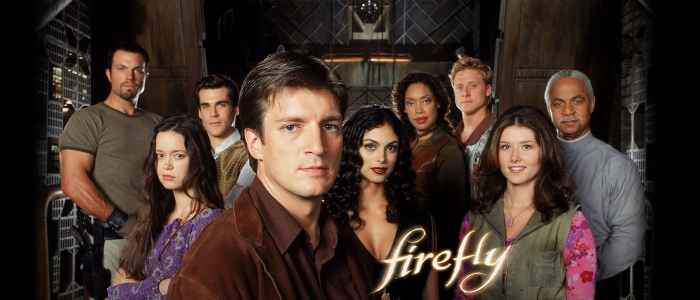
Joss Whedon’s Firefly 1 has captured the hearts of many viewers, despite its length of one lonely season. It has all of the trappings of a lovable science fiction drama, which outfits a stellar cast as they brave the new frontier at the edge of the solar system, dodging the law and other dangers at every turn. While the sets and special effects of the show are not particularly awe inspiring, the characters are so thoroughly developed that the audience is immediately drawn into their fantastical world. Whedon has been known to incorporate psychological themes in his characters and story lines. Though he has not publicly discussed using psychological personality traits from psychologists such as Freud or Jung, the writing suggests he at least subconsciously had these ideas in mind. While the characters can stand apart from each other, Firefly is a wonderful show because their dynamic interaction with each other makes them lovable. When the audience can see a part of themselves (albeit exaggerated) in each of the characters, they can begin to understand themselves in a different way. From a Freudian or Jungian standpoint, this can give the audience deep insight into the nature of their own personality.
The Characters
The first episode of the series, “Serenity,” begins with a flashback of the battle of Serenity Valley from the perspective of Malcolm Reynolds, and depicts his sorrow when he discovers that the resistance against the Alliance has failed and everything he fought for was lost. The show follows Mal and his crew aboard Mal’s ship, Serenity — named after that final battle — as they scavenge the outskirts of the universe for scraps, earning feeble pay for dangerous and illegal “jobs” (like transporting illegal cargo) for various clients. Their crew sports a diverse group of characters featuring Zoey, Mal’s friend from his army days; Wash, Zoey’s husband and the crew’s pilot; Kaylee, the adorable mechanic; and Jayne, an ex-thug whose love for guns and explosions is a running joke throughout the show. Even though the war is over, Mal still fights the alliance whenever he gets the chance.
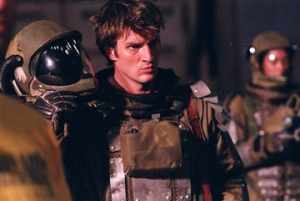
In need of extra money and a guise for their illegal transporting, Serenity docks at one of the outer rim planets where they accrue an unlikely array of passengers. They pick up a Shepherd (an unexplained religious figure), an undercover federal agent, and a doctor who is secretly helping his fugitive sister run from the Alliance. After a slight altercation, which results in a not-so-happy outcome for the federal agent, Mal finds himself at odds with his simple “do work, get paid” strategy and this higher calling to protect his fugitive crew member. He is torn between his rage against the Alliance and his moral duty to help others. This rage comes to a climax at the end of the series when Mal discovers the connection between the evil of the Alliance and the terrible Reavers (men gone mad at the edge of the universe), who plague the people living on the outer rim. In the end, Mal sacrifices everything to expose the cover-up of the Alliance’s involvement in creating the Reavers.
The Ego and Superego
The writing of this show has many layers of meaning which can be analyzed from a Freudian perspective. As the captain of the crew, Mal represents the Ego. He is constantly torn between Thanatos (rage) impulses (from within and without himself) and that of the higher needs of the crew. The Shepherd represents the superego, as he often voices the needs of the crew in an attempt to make sure Mal has his morals straight. In “Our Mrs. Reynolds,” the crew finds a stowaway woman on the Serenity only to find out that Mal, during his drunken partying with the village the night before, accidentally participated in a wedding ceremony with the woman. The preacher bluntly reminds Mal not to take advantage of her, warning him that if he does, he will burn in the special place in hell that is also reserved for “child molesters and people who talk at the theater.”
While Mal serves his moral callings, through his duty to the crew and his aid for the Doctor and his sister, he also serves the Id which is represented by his rage against the Alliance. He gets in fights with the Alliance and has no pity for those who work for the government or their supposed ideal for peace. While Mal often fights his underlying rage within himself, the true icon of the Id in the Whedon universe is the Reaver.
The Id
During the episode “Serenity,” the crew discovers to their horror that a Reaver ship is approaching. They watch in desperation as a ship with red war paint and dead bodies chained to the outside passes slowly by. Zoey explains to the newer members of the crew just how horrible the Reavers are. She calmly describes their method of killing their victims when she says “If they take the ship, they’ll rape us to death, eat our flesh, and sew our skins into their clothing. And, if we’re very lucky, they’ll do it in that order.”
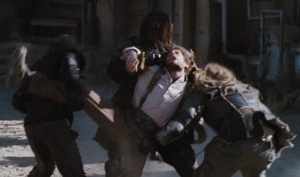
The Reavers embody the idea of the Id, which Freud described as untampered libido and Thanatos. This kind of horror has to be contained, otherwise it could wreak all sorts of terrors on society. Reavers are the most feared enemy of the galaxy, striking terror in the hearts of even the Alliance army. It is not until the very end of the series, when Mal and his crew discover the true origins of the Reavers, that his conflict with the Alliance is finally resolved. Though Freud is content to simply say that the Id is inherent and not directly accessible, the season finale takes the Id (or the Reavers) a step further, symbolically showing how an inquiry into the origins of rage can resolve conflict and restore peace.
From Freud to Jung
Freud’s philosophy of personality is fairly limited to general provinces of the mind and stages of development that leave most readers uncomfortable due to their sexual nature. Jung, a former friend of Freud, takes off where Freud stops in his theory of personality. Jung’s additions to Freud’s theories cost him his status as Freud’s “successor”, and the two eventually parted ways. Jung believed that there was more to the unconscious than what Freud posited. He took the idea a step further when he introduced his idea of the “collective unconscious.” According to Jung, it was this unconscious through which ideas from our ancestry are transferred. This collective unconscious is his explanation for universal themes such as “God” or “mother.” It is also where Jung argues a part of our personality come from, which he terms “archetypes.”
Jung believed that a personal experience corresponding with a latent primordial image “activates” an archetype. Jung’s philosophy at first glance seems more akin to Asian mythology than a respectable theory. However, new information from the field of physics suggests that Jung’s archetypes might pose a valuable connection for the “Cartesian split” between body and mind 2. While Jung argues that there could be any number of archetypes that manifest, there are a select few that are extremely common. Whedon’s Firefly characters conveniently portray the characteristics of these common archetypes.
The Persona vs The Self
In “Serenity,” episode one, we are introduced to Simon’s character. He is stoic and wears expensive clothing that sets him apart from the dusty, dirty bystanders that crowd the streets in front of the docked ship.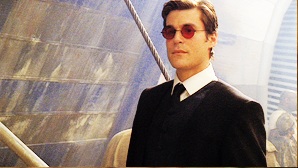 The doctor represents what Jung would call the “persona” which is the outward face we display to the world. We put on a persona for various reasons. For the doctor, it was important to appear reserved so as not to draw dangerous attention to himself. To the crew, he appeared aloof and distant, but inside he was afraid. Throughout the series, he constantly puts on this front as he attempts to shield his sister’s mental condition from those around him so as to avoid suspicion.
The doctor represents what Jung would call the “persona” which is the outward face we display to the world. We put on a persona for various reasons. For the doctor, it was important to appear reserved so as not to draw dangerous attention to himself. To the crew, he appeared aloof and distant, but inside he was afraid. Throughout the series, he constantly puts on this front as he attempts to shield his sister’s mental condition from those around him so as to avoid suspicion.
The other archetypes are more authentic, and Jung would argue innate in everyone to some degree. Kaylee’s character represents the “self.” This is your true and authentic self as it naturally moves towards growth and perfection, without the adornments of a persona. In “Shindig,” Kaylee accompanies Mal when they go to a fancy ball to discuss a deal with a client. She attempts to fit in with the other ladies at the dance, only to be ridiculed for her “store bought dress.” Mal later finds her sitting with a group of young men, happily chatting with them about the proper models of spaceship parts one should use. She is perfectly content to simply “be herself.” Jung describes how the “self” draws upon all of the other archetypes for strength, thus making it the most authentic personality type. Unsurprisingly, this is why Kaylee is one of the most popular figures of the series.
The Animus and Anima
Jung introduces the archetypes of Animus and Anima, which Zoey and Wash’s relationship exemplifies. The Animus is the masculine archetype in women while the Anima is the feminine archetype in men. Zoey and Wash defy gender stereotypes, with Zoey being the rational and tough leader (a role usually given to a male character) and Wash being the emotional supportive character.
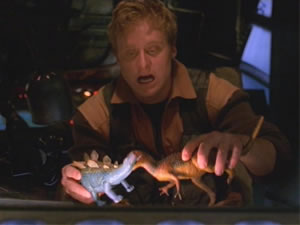
Wash tries to reverse this dynamic in the episode “War Stories” by having Zoey stay behind and accompanying Mal in her place for a dangerous mission. After things go south, Zoey resumes her role as the calm and strong character in order to rescue Wash and Mal from the clutches of the crime lord, Niska. Even though we might not like his adherence to cultural stereotypes, Jung points out that there can be feminine and masculine characteristics in anyone. Wash fought his role because he felt emasculated, but this fight against his own nature only put Mal and himself in danger. At the end of the episode, Zoey is seen cooking dinner for a wounded Wash and all is right again. Both characters accept that they can have masculine and feminine characteristics without jeopardizing their love for each other.
The Great Mother and Wise Old Man
Jung presents two archetypes “Great Mother” and “Wise Old Man” that could also be present in any person, man or woman. Shepherd Book represents the Wise Old Man, with his sage wisdom that appeals both to reason and emotion. When Kaylee sat outside Serenity recruiting passengers for their next flight in episode one, she noticed he was spending more time looking at the ships than their destinations. When she asks him why he doesn’t care where they are going, he says “Because how you get there is the worthier part.” Inara represents the counter archetype, the “Great Mother.” She is a “Companion” or as Mal says to Shepherd Book in “Serentiy,” “she’s a whore, preacher.” The clash between the Id of Inara’s line of work and the Superego of the preacher’s profession makes Mal uncomfortable as he stands between them at their first meeting, and he confronts the Shepherd about this asking, “this isn’t going to be a problem for you, is it?” before the Shepherd even has a chance to say anything.
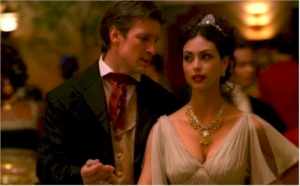 Though Mal is at first hostile towards Inara, we later learn that he has deep feelings for her. The Great Mother is characterized by Jung as fertile and nurturing. The opposite side also lies in the Great Mother, as she has the potential to destroy as well. On par with her representation of the Great Mother, Inara holds Mal’s heart in the palm of her hand, thus having the power to nurture or destroy him.
Though Mal is at first hostile towards Inara, we later learn that he has deep feelings for her. The Great Mother is characterized by Jung as fertile and nurturing. The opposite side also lies in the Great Mother, as she has the potential to destroy as well. On par with her representation of the Great Mother, Inara holds Mal’s heart in the palm of her hand, thus having the power to nurture or destroy him.
The Shadow and the Hero
Jayne represents the shadow, which Jung defines as the undesirable qualities we possess but do not want to face. While Jayne has that tough yet endearing (and at times even innocent) personality, he also portrays the bane and crude thoughts or desires that many individuals have but would not admit to. Unlike the other characters, there is no filter to his flaws, causing his crude behavior to be unavoidable. He even betrays his friends at one point, which Mal confronts with mercy. Jung argues that we should come to know our own shadow, and that it is our “first test of courage.” It is possible that Mal saw a part of himself in Jayne when he confronted him of his betrayal, which caused Mal to act with compassion through allowing Jayne to remain with the crew.
Mal, of course, is the Hero archetype. For Jung, the Hero is a powerful person who also has a “tragic flaw.” Even though Mal is no longer a soldier, he keeps his dignity through his unwavering insistence for decency. When the doctor asks Mal in episode one how he could know Mal would not kill him in his sleep after what happened, he replies “You don’t know me, son, so I’ll say this once. If I ever kill you, you’ll be awake. You’ll be facing me, and you’ll be armed.” Other characters who do know Mal see this heroic side of him. While discussing a deal with “Badger,” a criminal they were working with on the planet Persephone, Badger tries to insult Mal when he says, “What were you in the war? That big war you failed to win. You were a sergeant, yea? Sergeant Malcolm Reynolds. Balls and bayonets brigade. Big, tough veteran. Now you got yourself a ship and you’re a captain. Only I think you’re still a sergeant, see. Still a soldier. Man of honor in a den of thieves.”
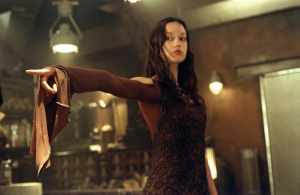
Jung’s Hero archetype always has some sort of flaw or weakness, which for Mal is represented by River, the doctor’s sister. She is the innocence of the world that Mal always strives to protect. Even though there are times when Mal becomes terrified by River’s psychotic outbursts due to her previous torture at the hands of the government, he always does his best to protect her at the expense of risking the entire crew to exposure. River’s escape caused panic in the government, who feared she would expose their closely held secrets. Their hunt for her poses a constant threat to the Serenity crew.
Despite all of the dangers and terrors of deep space the crew faces, they have each other. In a conversation between Inara and Simon in the episode “Serentiy,” she tells him “You’re lost in the woods. We all are. Even the captain (Mal). The only difference is he likes it that way.” Mal walks into the room and interjects “No, the only difference is the woods are the only place I can see a clear path.” It is the joys as well as the sorrows that bring out the best and worst personalities of these characters. In Mal’s case, he finds himself in the heat of the struggle. Jung and Freud would argue that if we look closely enough at these characters, we will find a part of ourselves in each of them. While we are not in a western space odyssey, we all have our own trials and challenges.
Freud and Jung were skeptical as to the effectiveness of self-analysis, but Freud’s “Id” and Jung’s “self” can be used to give deep insight into the nature of one’s own psyche 3. Through an analysis of and connection to the characters of Firefly, we can also begin this journey of self-discovery. The question then becomes one of personality, and an inquiry into the origins of our self and our traits or behaviors. The characters of Firefly often attempted yet failed to ignore these questions. We can learn from their mistakes and begin to analyze our own personalities through an examination of theirs.
Works Cited
- Whedon, J. (Creator/Producer). (2002). Firefly. US: 20th Century Fox Television. ↩
- Stevens, A. (1995). Jungian psychology, the body, and the future. The Journal of Analytical Psychology, 40(3), 353-364. ↩
- Plaut, A. J. (2005). 2. Freud’s ‘id’ and Jung’s ‘self’ as aids in self-analysis. The Journal of Analytical Psychology, 50(1), 69-82. ↩
What do you think? Leave a comment.











Very clever article for a very clever show. Breaking down the characters into psychological term is very clever, and I too see the Reavers as the Id.
Joss you made a great show, its outshines all your other work. and continues to do so…
If they were to reboot the series I’d say that they should disregard Serenity all together, lets face it wasn’t really in the spirit of the show, Mal was too angry and rash, River more fragmented than when the show started, Simon was much more commanding than he should have been, Inara was seamed a lot more like the damsel in distress and Wash seamed much more childish. Also the ship itself just looked off, something to do with the coloring I think.So if they remake firefly I’d say to hell with the movie.
Thanks for this great post. I haven’t seen Firefly and have been really hesitant to watch it, despite all my friends disowning me. But I’ve seen THEM watch it, and then break down in tears and get into hour-long rants about how they hate the world for making Firefly end. It’s always been an internal battle I’ve had.
Bebop, Firefly, and Trigun form the Science Fiction Western Trifecta.
I’ve watched an episode or two of Trigun, and I have to say the silly is way off the charts vs. Bebop or anything else. Maybe I just didn’t give it enough time to get to the good stuff, but I thought the show was just a little too ridiculous to be put on the same level as these other shows.
I have not watched Firefly. A friend of mine owns the DVDs and the movie, and has offered to let me borrow them. You see, I’m sure I’ll like the series. I loved Cowboy Bebop’s mix of science-fiction and western, and enjoyed Trigun as well (but not nearly as much as Cowboy Bebop). If I watch Firefly, I will like it, and I will lament its all too short run.
Thanks for reminding me of the movie, I forgot it existed and was slumped in boredom because I’ve finished Firefly just two days ago.
You just proved one more time that everything Mr Whedon and Co do, they do for a reason, and not just because something might look cool.
Fantastic analysis. Thanks so much for writing this!
Wish I had watched the movie “Serenity” before reading this. I mean, I still will, but I might have appreciated the analysis more.
It is unfortunate, then, that it was only just about a year ago when I finally got to watch this series on Netflix. Well, as they say, it is better late than never!
I have never watched another tv show on FOX due to their cancellation of Firefly.
Now that’s fandom!
I just got into Firefly this past month and watched all 14 episodes before buying Serenity, to which I just watched last night. IMO, the series blows away the movie and it’s not even close. I REALLY REALLY wanted this to be an excellent movie but there were too many things I found wrong with it (Reavers notwithstanding).
To me, I feel that a lot of what I really liked on the series was not in the movie at all. For example, some of the best character-driven scenes in the episodes were when everyone was around the kitchen table and talking. In the movie, the only time they show that table at all is when they run through the kitchen.
I also didn’t like (or understand) why in the movie suddenly Mal and Simon seem to really hate each other now. Mal didn’t even dislike Simon this much in the series’ pilot! One of the things I liked best about how Mal handled his crew was the fact that he cared about and protected them and you could really see / feel that in many instances throughout. I got almost none of that feeling while watching Serenity.
And since when did Kaylee get regulated to the 3rd string? She’s a pretty major character on the show and in the movie she hardly got any lines and just kind of stood there a bunch. Which of course is nothing when compared to Inara, who had almost nothing to say at all and that was a shame.
Not saying that Mal didn’t deserve the spotlight of course (the dude is awesome, without a doubt) but for such a fleshed-out ensemble it kind of sucked that 5 or 6 of them were almost always background noise in this movie.
P.S: I was waiting for Book to show up for what seemed like forever, and then they go and kill him off. WTF was that about?? That sucked too! (lol)
Thanks for the insights, it really helped me appreciating it even more.
Great article. I have never seen this show, although many of my close friends are fans and I worked with one of its stars. I really will have to watch it soon. I enjoyed reading your take on it.
I really liked the theme song from day one. It was so very different from the usual.
Hmmm … a SciFi fantasy vision of the future in which there are very few if any Asians or other people of color, and White people are numerically dominant.
This show is sacred.
here’s a tip: if you haven’t yet, do listen to the commentary for “War Stories” with Nathan Fillion and Alan Tudyk. It’s hilarious.
I actually didn’t like their commentary particularly because they didn’t reveal that much about the episode from their own creative perspectives (The interesting little character decisions). I found this annoying because this was one of two actor only commentaries on the discs. The commentary that I found most interesting was that of Shawna Trpcic (for Shindig) where she revealed that the thing that Zoe wears around her neck is the symbol of her marriage vows to Wash. In comparison to the commentary for this episode I liked the commentary for the pilot episode with Nathan and Joss better because we got humor and insight.
Thank you Whedon for coming up with such a great idea for a series in the first place!
Excellent info. Clipping to reread frequently.
This is one of the best TV-shows i’ve ever seen!
Joss Whedon had created such a wonderful first season, if the show had continued, there were so many story lines to build on. I think FF would have been an Emmy factory.
STILL hurting over the loss of this show. *sigh*
I’ve watched (and I own) both the series Firefly, as well as the movie Serenity. I’ve also began wading through the Buffy series, but I am still in the early years. I’ve also read a good portion of Joss’s run on X-Men.
I know I’m gonna catch hell for this, but I am so sick of all this firefly fetishism. That show was the pits.
How dare you…
that was an amazing analysis, bravo
I loved Firefly and Serenity but I have to ask: What of the speculation that before the vexing cancellation and the Big Damn Movie, the Reavers were supposedly going to be exposed as the dispossessed native residents of the ‘Verse?
I had always tried to avoid watching Firefly, because I knew I would lose either way.
I think the show would have done better if the theme song wasn’t so cheesy, people are picky about that whenever they begin to watch a show with people around.
Just finished watching the complete series of Firefly on DVD. So good!
Great article. My favorite characters where Simon, Shepard, kaylee and Mal.
Good post.. but i think Firefly deserves another post about the actual characters of the show and their ability to generate conflict…. or lack thereof when the plots are resolved
Excellent analysis of one of the best shows ever to grace the small screen.
Such an awesome Tv series. I love every single episode, wish they made more.
I watched the series shortly before the movie came out, and the movie just didn’t “end” things well enough for me. I understand that Weadon probably wanted to leave things open enough for another run, but part of me knew the truth: this show is too quirky to establish enough of an income base to be picked up again.
I watched the movie before the series and think it really worked better as a show. It just seemed to have the time to develop more.
But who cares, Freudian analysis is reductive and not really useful, other critical methods can yield results that make sense for human nature. It’s like people want to think Freudian theories are useful without looking at the principles of them. Maybe the author should read Anti-Oedipus for a good argument against this content
I believe Whedon was inspired by the book The Killer Angels.
Very well written, and thanks for the history lesson!
What a wonderful read. I had no idea how well these archetypes fit with the characters. Thank you!
Love this. I dislike the phrase Space Western some people coin it. Space Western although very literally a correct description, is so blunt absurd if its used to describe the show it seems either off-putting or belittles the show. Defining it as a this metaphor seems to give it the intrigue and depth that is apparent in the show.
Really well written, I like the analysis of the characters. I recently just watched the whole season and the movie so what you said about their interpersonal relations struck true to me.
I never looked at the show the way you have, very interesting! Firefly was cancelled much too early, such a shame. I heard Joss Whedon is starting a new series that pretty much tells the story of a “cult-classic series” getting cancelled and whatnot, should be good.
Very cleverly written
Your comment about Whedon possibly subconsciously including information about psychology was incredibly witty.
I really like how thoroughly the characters were analyzed.
In many conversations I have had with my fellow nerds on many things about Firefly, one thing about the show was that the viewer felt like they were part of that world and perhaps part of the crew. Like we are an observer on the ship and through their journey you feel like you know these people and sympathise with their situations. So this makes sense when applying psychological principals to characters in a show – as the article says – it draws you in.
I’m not entirely sure I agree with your break down of the Freudian and Jungian influences here. Both of these are actually quite complex theoretical frameworks that are focused on the nuances of psychological personality portrayal. Part of what you have not discussed is that the aspects of Freud and Jung are meant to be applied to every character, not simply having one character representing one aspect exclusively. Although this can be done for more simplistic or allegorical texts, such as vignettes, this is not really a true representation of the complexity of Whedon’s character work. Although on the surface you are correct in each characterisation, it would have been more helpful to look at how each character demonstrates each aspect at different narrative points within the show, ie. when particular situations or interactions/encounters draws forth that aspect. I think this was a good introduction to the theories, but could have been further applied to do Whedon better justice in that his characters are always multilayered and faceted creations that are able to react and interact in realistic ways within the universe they are placed.
Great Job! Keep on posting such a good articles…
A good essay.
I enjoyed your take on Firefly. I especially liked comparing Inana to the Great Mother. There is a stage in the hero’s journey called “Meeting with the Goddeess” and next time I watch the show I am going to see if her and Mal’s interaction also fits that incarnation of the hero’s journey.